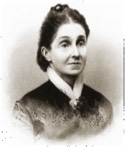The Latimers - Person Sheet
The Latimers - Person Sheet
Birth Date15 Aug 1820
Death Date19 Feb 1892 Age: 71
FatherMINOR, Dabney (1769-1822)
MotherHERNDON, Lucy (1779-1832)
Spouses
Birth Date27 Mar 1824
Birth PlaceCaroline County, Virginia
OccupationSuffragist
Death Date14 Aug 1894 Age: 70
Death PlaceSt. Louis, St. Louis County, Missouri
FlagsHistorical
FatherMINOR, Warner (1792-1830)
MotherTIMBERLAKE, Maria (1799-)
Misc. Notes
Little is known of her early life. In 1843 she married Francis Minor, a distant cousin and a lawyer with whom she settled in St. Louis, Missouri, the following year. At the outbreak of the Civil War she became an active member of the St. Louis Ladies Union Aid Society, which shortly became the largest branch of the Western Sanitary Commission. The successful management by women of the complex activities of the society--collecting and distributing clothing and supplies, staffing army hospitals, helping in the field and even at the front--encouraged Minor's belief that women deserved political equality.
As early as 1865, when enfranchisement of former slaves was a topic of public debate, Virginia Minor was the first woman in Missouri to suggest publicly that women be granted the vote. Early in 1867 she petitioned the Missouri legislature to that end but without success. In May of that year she organized in St. Louis, and became president of, the Woman Suffrage Association of Missouri, said to have been the first organization anywhere devoted to the single aim of woman suffrage. She remained president of the group until 1871, when she resigned because the state group had voted to affiliate with the more conservative American Woman Suffrage Association rather than with the older National Woman Suffrage Association, of which Minor was a member.
Minor made a notable impact on the NWSA in 1869 by proposing a legal stratagem for quickly attaining suffrage. She argued, simply, that the 14th Amendment to the Constitution implicitly guaranteed the franchise to women. The association adopted her argument and used it widely. In October 1872 Minor attempted to register to vote in St. Louis, and when refused she brought suit against the registrar. The test case Minor v. Happersett (1874) was appealed all the way to the U.S. Supreme Court that declared that despite the privileges and immunities clause, a state can prohibit a woman from voting. The court declares women as “persons,” but holds that they constitute a “special category of nonvoting citizens.” Although lost, the case generated much publicity for the cause of woman suffrage.
In 1879 the National Woman Suffrage Association organized a Missouri branch, and Minor was elected president. In 1890 she became president of the state branch of the merged National American Woman Suffrage Association. She resigned for health reasons in 1892 and died in St. Louis, Missouri, on August 14, 1894.
As early as 1865, when enfranchisement of former slaves was a topic of public debate, Virginia Minor was the first woman in Missouri to suggest publicly that women be granted the vote. Early in 1867 she petitioned the Missouri legislature to that end but without success. In May of that year she organized in St. Louis, and became president of, the Woman Suffrage Association of Missouri, said to have been the first organization anywhere devoted to the single aim of woman suffrage. She remained president of the group until 1871, when she resigned because the state group had voted to affiliate with the more conservative American Woman Suffrage Association rather than with the older National Woman Suffrage Association, of which Minor was a member.
Minor made a notable impact on the NWSA in 1869 by proposing a legal stratagem for quickly attaining suffrage. She argued, simply, that the 14th Amendment to the Constitution implicitly guaranteed the franchise to women. The association adopted her argument and used it widely. In October 1872 Minor attempted to register to vote in St. Louis, and when refused she brought suit against the registrar. The test case Minor v. Happersett (1874) was appealed all the way to the U.S. Supreme Court that declared that despite the privileges and immunities clause, a state can prohibit a woman from voting. The court declares women as “persons,” but holds that they constitute a “special category of nonvoting citizens.” Although lost, the case generated much publicity for the cause of woman suffrage.
In 1879 the National Woman Suffrage Association organized a Missouri branch, and Minor was elected president. In 1890 she became president of the state branch of the merged National American Woman Suffrage Association. She resigned for health reasons in 1892 and died in St. Louis, Missouri, on August 14, 1894.



